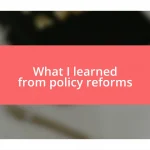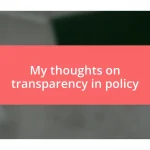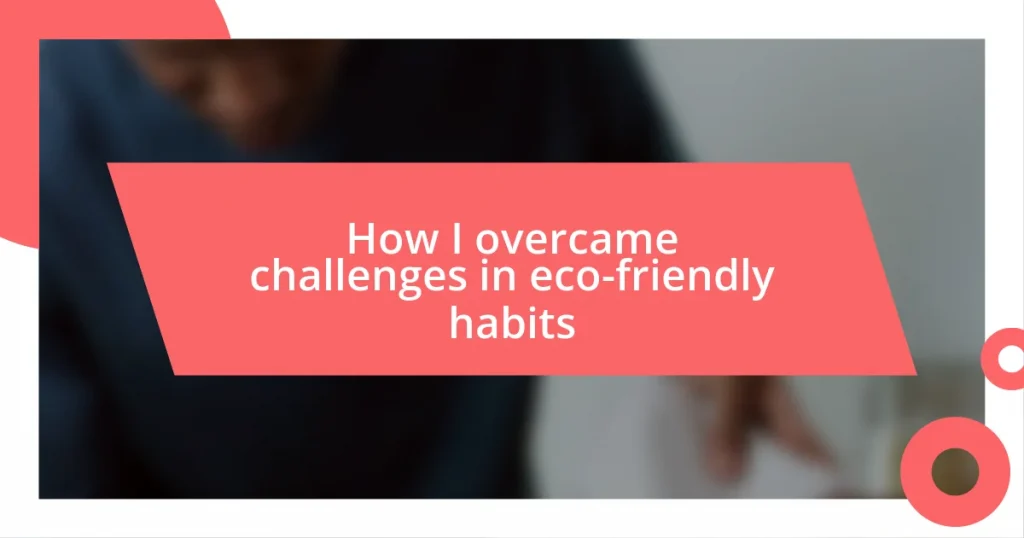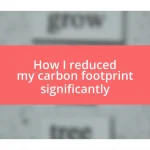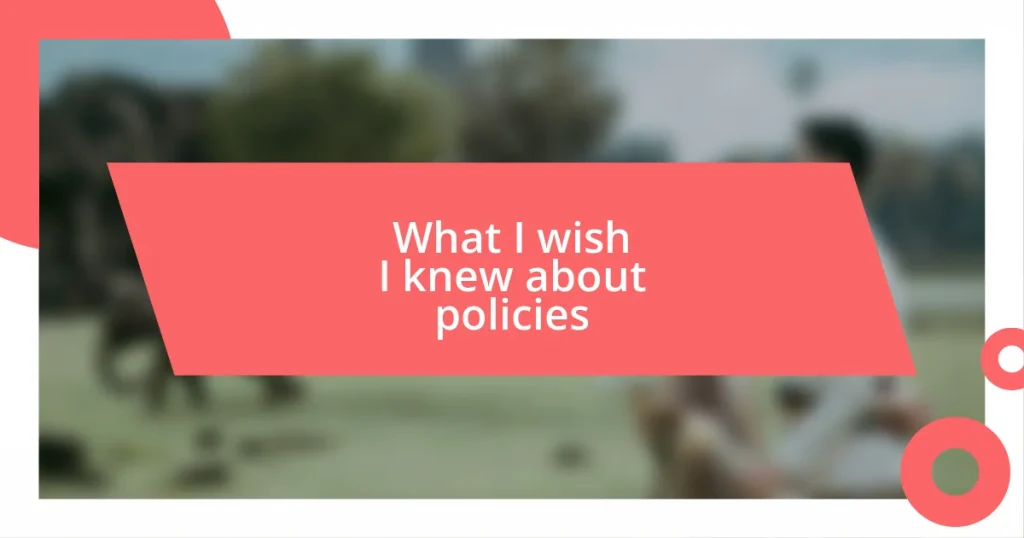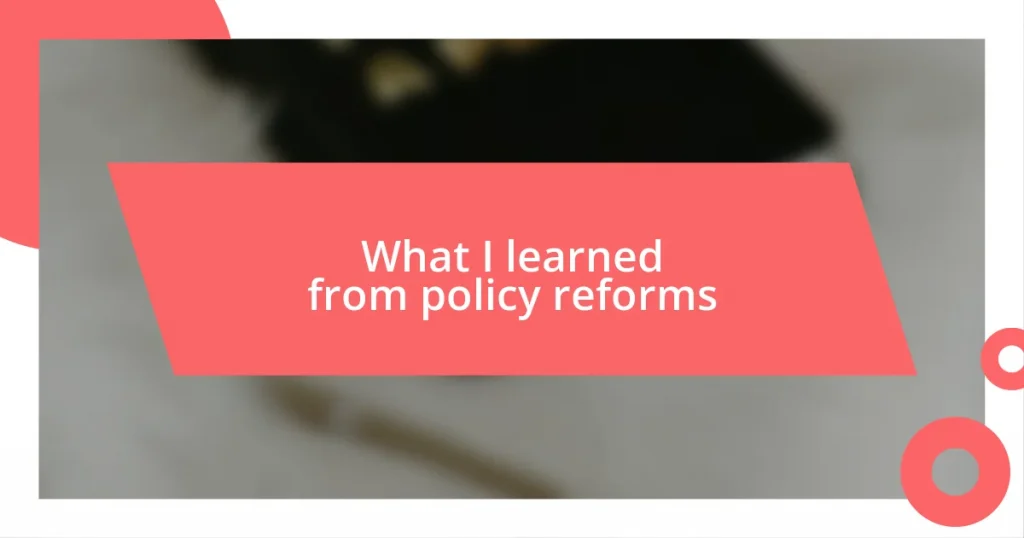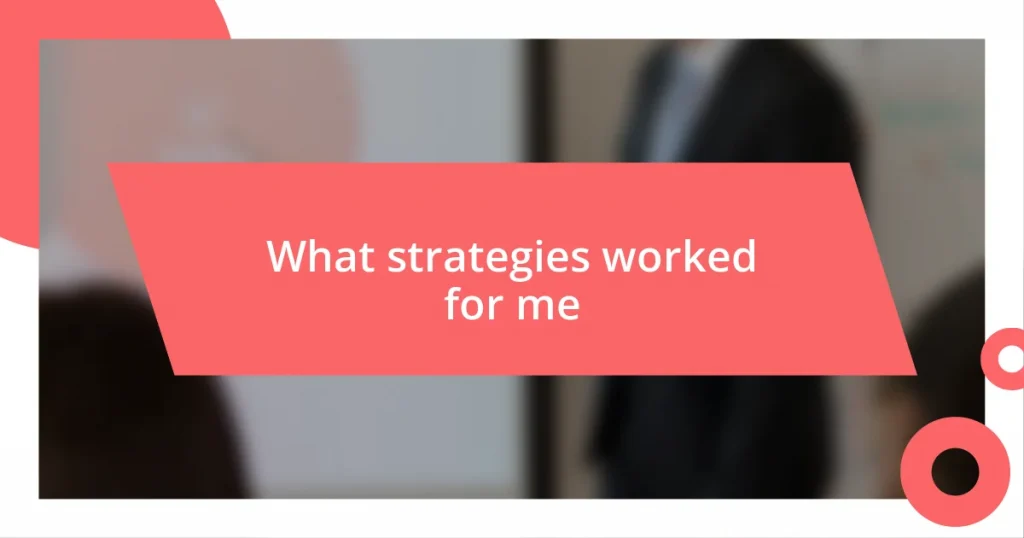Key takeaways:
- Recognizing personal eco-friendly challenges and the emotional impacts of habits fosters a sense of accountability and progress toward sustainable living.
- Setting realistic and manageable eco-friendly goals, while celebrating small victories, empowers individuals to maintain motivation and build positive habits over time.
- Creating a supportive community and utilizing resources enhances the eco-friendly journey, facilitating shared learning and inspiration among like-minded individuals.
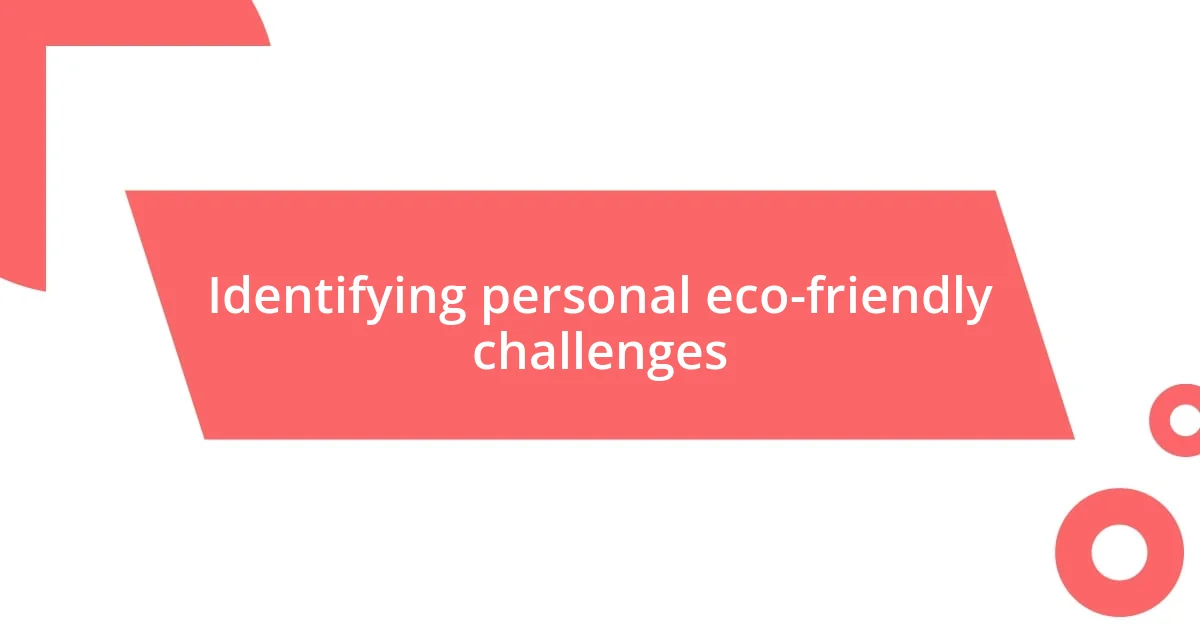
Identifying personal eco-friendly challenges
Identifying personal eco-friendly challenges can sometimes feel overwhelming, especially when you realize how ingrained certain habits are. I remember a time when my love for convenience led me to order takeout more often than I’d like to admit. Each time I threw away those plastic containers, a twinge of guilt hit me, forcing me to reflect on what I could change.
Another challenge I’ve faced is my relationship with consumerism. The allure of new clothing and gadgets often made me overlook the environmental cost. Have you ever felt that rush of excitement before purchasing something, only to feel guilty afterward when you considered the impact? It was through these experiences that I learned to pause and evaluate my choices before hitting that checkout button—creating a personal checklist of eco-friendly alternatives to guide me.
I also struggle with the idea of perfection in my eco-friendly journey. Sometimes, I catch myself feeling discouraged when I slip up, like forgetting my reusable bags at home. This made me question—why do I expect myself to be perfect? Acknowledging these slip-ups not only helped me to manage my guilt but also opened my eyes to the importance of progress over perfection. It’s a continuous journey, and understanding these challenges is the first step toward meaningful change.
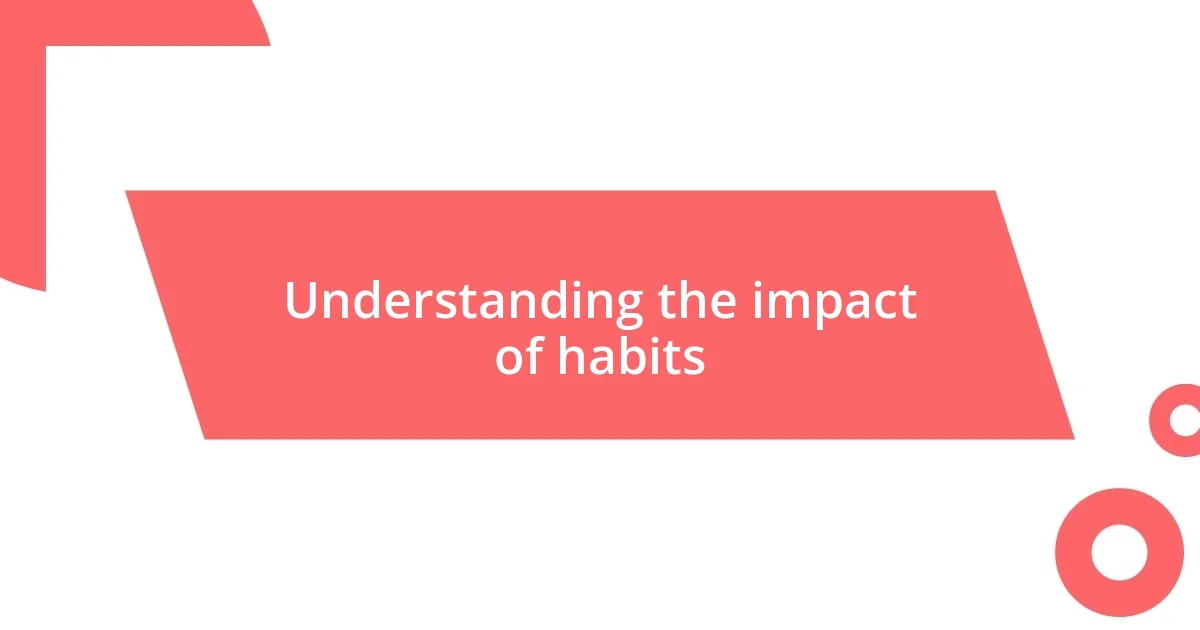
Understanding the impact of habits
Understanding the impact of habits goes beyond just recognizing daily actions; it’s about acknowledging the emotional and environmental consequences tied to them. For instance, I remember how my morning routine often included a single-use coffee cup. The moment I realized just how many of those cups accumulated over time, it sparked a deeper awareness about the waste I was contributing to each day. This realization encouraged me to shift to a reusable mug, instilling not just a change in habit but a sense of responsibility.
As I dove deeper into eco-friendly living, I recognized that habits are often shaped by social influences. I observed how my friends reacted to my choices; some were supportive, while others questioned my commitment. This made me reflect on how our surroundings significantly impact our decisions. Don’t we all want to be accepted? But through these challenges, I began to experience a surprising sense of empowerment; it taught me that changing habits is not just personal—it’s a way to inspire others and, ultimately, create a collective impact.
In my journey, I learned that each small change can have a ripple effect, transforming not only my lifestyle but also influencing those around me. When I started composting, for example, my neighbors became curious. It’s fascinating how habits can cultivate community awareness. So, I see my habits not just as individual actions, but as pieces of a larger puzzle that can contribute to a healthier planet.
| Habit Type | Environmental Impact |
|---|---|
| Single-use plastics | Increases landfill waste and pollution |
| Reusable items | Reduces resource consumption and waste |
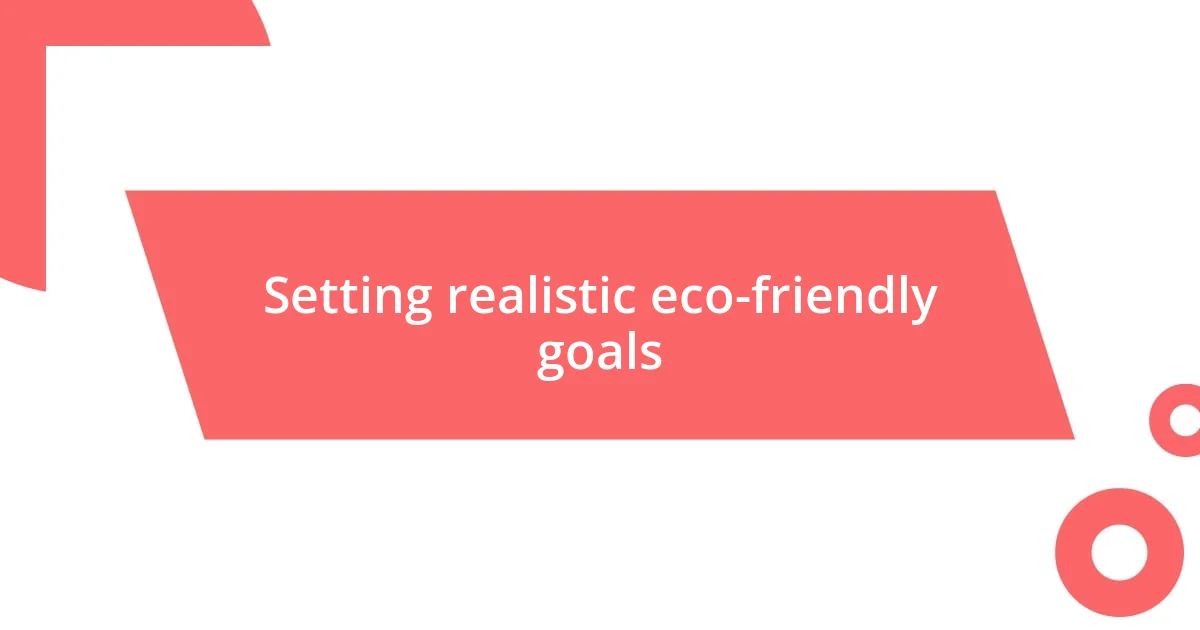
Setting realistic eco-friendly goals
Setting eco-friendly goals is about finding a balance that feels achievable rather than overwhelming. I recall when I ambitiously set out to eliminate all plastic from my life overnight, only to find myself disheartened within a week. Instead, I shifted my focus to one goal at a time—like reducing single-use bags before tackling my water bottle habit. It was a humbling reminder that change takes time, and that’s perfectly okay.
To help structure your own realistic eco-friendly goals, consider this simple approach:
- Identify One Area: Focus on a specific habit like reducing energy use at home.
- Set Clear Targets: Instead of vague objectives, aim for measurable goals, such as lowering your electricity bill by 10%.
- Establish a Timeline: Commit to a specific timeframe—like three months—to reassess and adjust your goals.
- Celebrate Small Wins: Acknowledge your progress along the way, even if it’s just remembering to carry a reusable bag when shopping.
- Stay Flexible: Understand that life may alter your plans. If a goal feels too ambitious, it’s okay to adjust!
By making my goals manageable, I feel more empowered and less overwhelmed. After all, in the journey toward eco-friendliness, it’s not just about what I achieve, but how I engage with the process along the way.
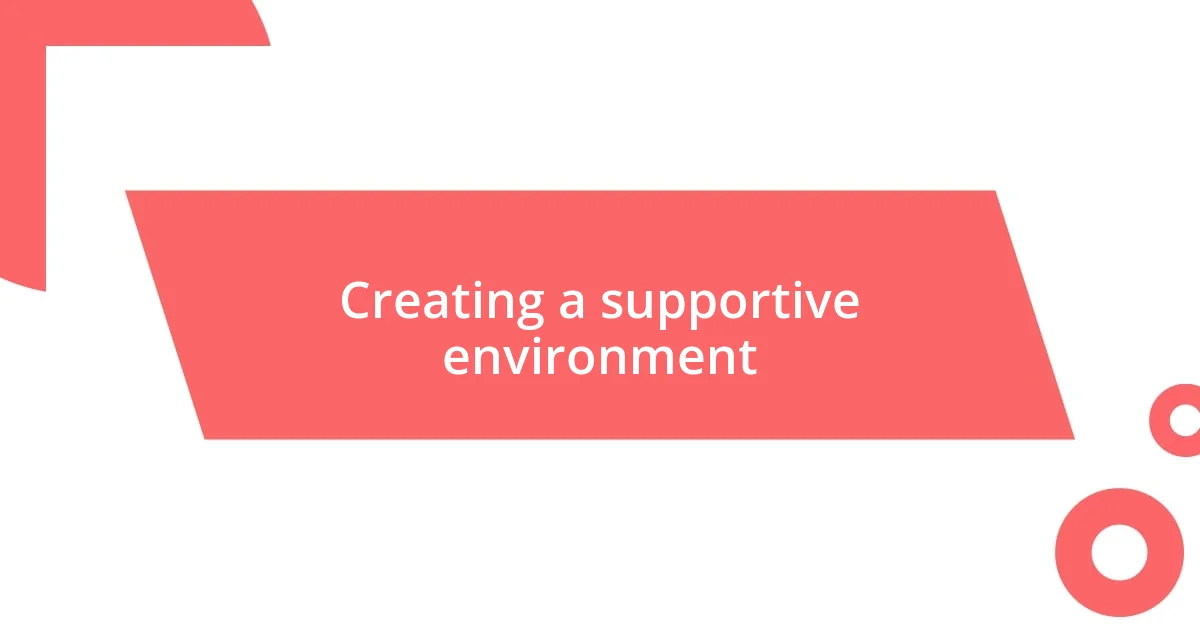
Creating a supportive environment
To create a supportive environment for eco-friendly habits, I found that surrounding myself with like-minded individuals was crucial. I remember the excitement I felt when I joined a local sustainability group. The energy was contagious—everyone was sharing tips, ideas, and their own experiences. It was more than just a gathering; it became a space where we all felt validated in our choices.
I realized that supportive environments not only encourage commitment but also foster accountability. When we challenge each other to stick to our goals, there’s a community aspect that makes the journey much more enjoyable. I started organizing monthly meet-ups to discuss our progress. The laughter, shared challenges, and collective brainstorming made the process feel less daunting. Have you ever had a moment when you felt uplifted just by being in the right company? That’s exactly what I experienced.
Additionally, I found that my family played a significant role in this equation. When I introduced new eco-friendly practices at home, such as reducing food waste or using compost, it was essential to involve them rather than impose changes. I still recall the joy in my daughter’s eyes when we made a homemade compost bin together. It was a bonding experience, and we turned an ordinary chore into an opportunity for creativity. How often do we overlook this simple idea? Engaging those around us in eco-friendly habits can truly transform not just our lifestyle, but also our relationships.
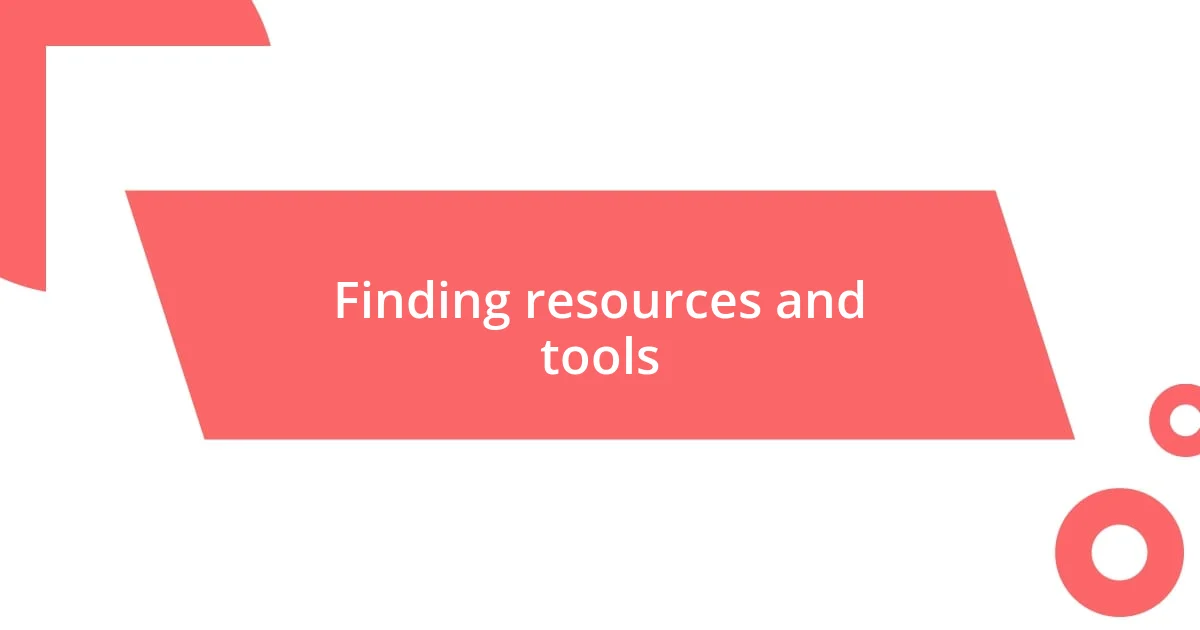
Finding resources and tools
Finding the right resources and tools can truly make a difference in adopting eco-friendly habits. I remember my first foray into sustainable living—I was overwhelmed by the sheer number of options available. Then, I discovered local apps that mapped out nearby zero-waste stores and farmers’ markets. It felt like finding hidden treasures! Have you ever stumbled upon a resource that perfectly fit your needs? It’s incredibly rewarding when that happens.
Online platforms have also become a game-changer for me. I joined various eco-friendly forums where seasoned practitioners shared their favorite tools and tips. I can still recall the thrill of learning about a new composting technique that transformed the way I managed my kitchen scraps. At one point, I was so inspired by a post that I immediately set up a compost bin in my balcony. Engaging with the community not only provided practical advice but also ignited my passion for sustainable habits.
When I started integrating eco-friendly tools into my daily life, I found myself continually learning. From reusable produce bags to eco-conscious cleaning products, each purchase was a small victory. Just the other day, I adopted a new digital planner that helped track my green initiatives, and the sense of accomplishment was palpable. Isn’t it amazing how the right tools can empower us to take decisive action? Each step, no matter how small, contributes to a more sustainable future.
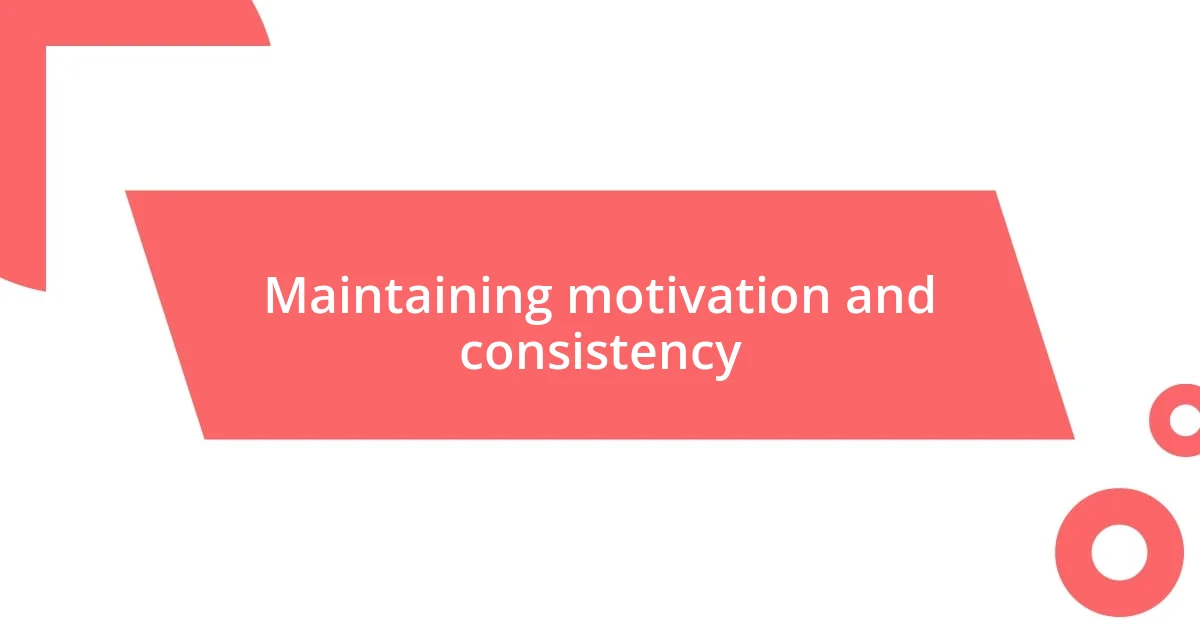
Maintaining motivation and consistency
Maintaining motivation and consistency in adopting eco-friendly habits has been a rewarding journey for me. I found that setting small, achievable goals was incredibly effective. For instance, I started with eliminating single-use plastics from my grocery shopping. Each time I returned home with a reusable bag rather than plastic, I felt a rush of pride. Isn’t it fascinating how little victories can fuel our motivation?
Another aspect that kept my motivation strong was celebrating the progress I made. I began a daily journal where I noted down my eco-friendly actions, big or small. It became like a personal cheerleader, reminding me of the positive changes I was making. There was a sense of joy in reflecting back on my journey, often prompting me to take on new challenges. Have you ever looked back and realized how far you’ve come? That realization can really ignite your drive to continue.
I also learned the value of staying inspired by following eco-conscious influencers and activists online. Their stories energize me and often offer fresh perspectives on living sustainably. I remember being particularly moved by a documentary on renewable energy; it reignited my commitment to reduce my carbon footprint. Connecting with these communities helps keep the spark alive, reinforcing the idea that we are not alone in this endeavor. How do you tap into inspiration when your motivation wanes? Finding that source of inspiration can be key to maintaining consistency.
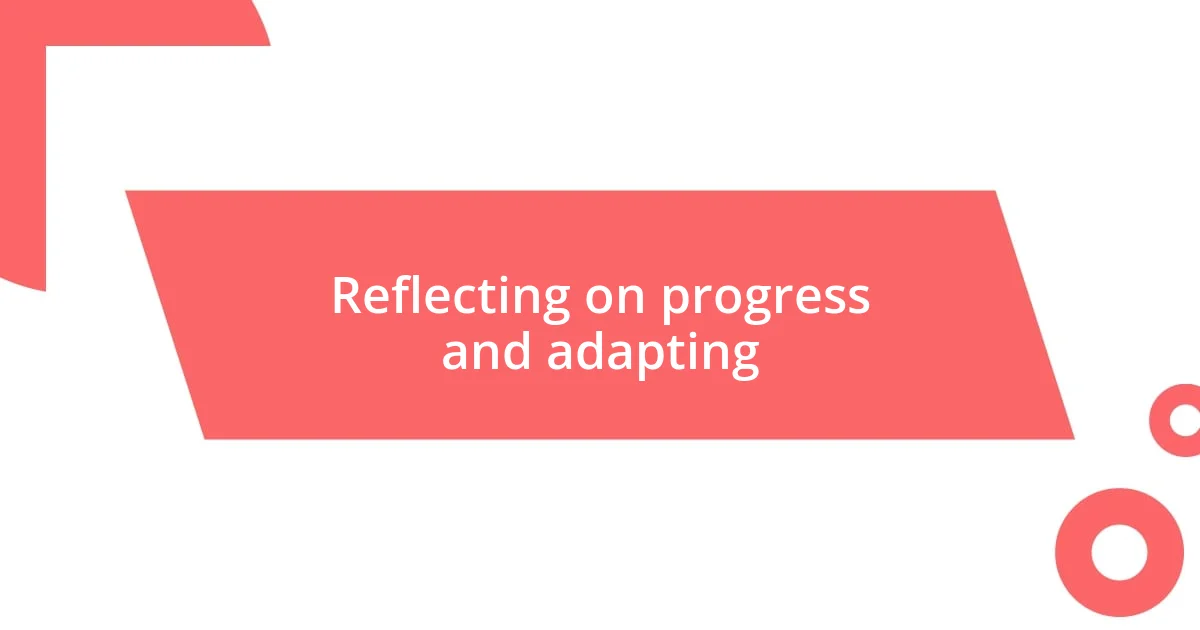
Reflecting on progress and adapting
As I reflect on my journey toward adopting eco-friendly habits, I often marvel at how far I’ve come. I remember those early days, struggling to find my footing amidst conflicting advice and information. It wasn’t until I took a moment to assess what worked and what didn’t that I truly began to adapt my approach. Have you ever had that eye-opening realization where a simple reflection changed your direction? For me, it was like clearing the fog; I could finally see the path forward.
Adapting has also meant being flexible with my goals. There were times when I felt overwhelmed or frustrated, like when I failed to stick to my meal prep plan using local produce. Initially, I was disheartened. But then I realized it was a chance to reassess my time management and cooking skills. Rediscovering my enthusiasm for experimenting with new recipes reignited my passion for seasonal cooking. This adaptability helped me pivot my habits—what have you learned from moments of struggle?
I’ve discovered that growth isn’t always linear; it requires reflection and a willingness to evolve. Keeping an open mind has allowed me to embrace changes in my lifestyle, such as trying new composting methods or exploring more sustainable fashion choices. Each shift I’ve made was not just about the action itself, but about how it made me feel more connected to the environment. It’s fascinating how adaptation can yield not just changes in habit but also a deeper sense of fulfillment. How do you embrace your own transformation in eco-friendly living?

